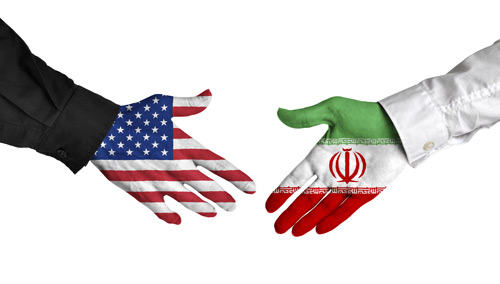
Can the US and Iran seal the deal? (Courtesy: iStockphoto/Kagenmi)
By Matin Durrani
Earlier this month my colleague Hamish Johnston published a blog post about the 70th anniversary of the bombing of Hiroshima, in which he reported on a piece by the science historian Alex Wellerstein about whether that first use of a nuclear weapon for non-testing purposes was justified.
It’s a hugely contentious issue – some say that the Hiroshima and Nagasaki bombings brought to an end a conflict that might otherwise have dragged on much longer, while others claim that a detonation well away from built-up areas would have been a better deterrent. Either way, the Hiroshima anniversary served as a pertinent reminder of the long and controversial role that physicists have played in designing and creating nuclear weapons, from the Manhattan Project onswards.
However, there have been plenty of physicists who have opposed the development of nuclear arms, including the Bulletin of the Atomic Scientists, which was founded in 1945 by Manhattan Project scientists who “could not remain aloof to the consequences of their work”. Another anti-nuclear group is the UK-based Scientists for Global Responsibility, whose executive director Stuart Parkinson is a physicist. Last week it published a report calling for the UK government not to replace its submarine-based Trident nuclear deterrent.
Now, a group of 29 leading US scientists and engineers, including six Nobel laureates, has written a two-page letter to US President Barack Obama backing the deal that the US – along with China, France, Germany, Russia and the UK – has struck with Iran to limit its development of nuclear weapons and permit inspections in return for a lifting of economic sanctions.
The group, which includes the Nobel laureates Philip Anderson, Leon Cooper, Sheldon Glashow, David Gross, Burton Richter and Frank Wilczek, praises the Joint Comprehensive Plan of Action (JCPOA), which it says is “a technically sound, stringent and innovative deal” that has “much more stringent constraints than any previously negotiated non-proliferation framework”.
The letter is also signed by Richard Garwin, a physicist who helped design the world’s first hydrogen bomb, and Siegfired Hecker, who between 1986 and 1997 directed the Los Alamos National Laboratory in New Mexico, where the original Manhattan Project was based. The scientists claim the agreement places a limit on how much uranium Iran can enrich and stockpile, while also restricting the number and kinds of centrifuges it runs and operates.
Together with other restrictions, they say it would take Iran “many months to enrich uranium for a weapon”, whereas before the current negotiations began, the country had sufficient 20% enriched uranium that it would have taken “only a few weeks” for it to get enough for weapons use. The JCPOA also provides “innovative approaches to verification”, the group says, including monitoring of uranium mining and milling, as well as of centrifuge manufacturing and research.
It concludes by saying that the deal “will provide the necessary assurance in the coming decade and more that Iran is not developing nuclear weapons, and provide a basis for futher initiatives to raise the barriers to nuclear proliferation in the Middle East and around the globe”.
Be that as it may, the deal, which has been spearheaded by US secretary of state John Kerry, still needs US congressional approval and there is no guarantee that it will get it. Many Republicans detest Obama and everything he stands for, and feel that negotiating with Iran is a sign of weakness.
The letter is well worth reading and the issue is certainly one to keep an eye on over the coming weeks. With a US presidential election next year, the 17 Republican candidates are all bidding to out-tough each other, so the agreement’s passage is unlikely to be smooth and Obama will almost certainly continue to have a rough ride.
The Iran nuclear deal per se may be good as far as Iran is concerned and for the “nuclear-arms haves” for their geopolitical aim to try to keep them limited to the “family. However, it will do nothing for the nuclear disarmament. One can argue that the possession of this arm by a good number of other countries would encourage the climate for nuclear disarmament, because the much touted nuclear deterrent doctrine will lose much of its relevance.